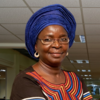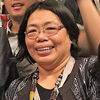List of Speakers and Panelists
 | Andrea Azevedo Director of Programs and Projects, JBS Fund for the Amazon |
Dr. Andréa Aguiar Azevedo, currently works as Director of Programs and Projects of the JBS Fund for the Amazon. She has idealized, raised funds and coordinated several projects in most states of the Amazon for the last 15 years, publishing more than 30 technical and scientific studies, with article highlights on Science and PNAS magazines. She holds a broad experience in the analysis of public environmental policies which control the use of natural resources in the Brazilian Amazon, especially regarding deforestation. It is worthy of note that she also has extensive experience working with multi stakeholder groups jointly with the private sector. Holding a degree in Biological Sciences and a Master degree in Economic Management of the Environment, she also holds a PhD in Sustainable Development from the University of Brasília (UnB) as well as an Executive MBA degree from Fundação Dom Cabral. Andrea is a board member of Conservation International – Brazil and of Amazon Concertation.
 | Mark Ashton Senior Associate Dean of The Forest School; Morris K. Jesup Professor of Silviculture and Forest Ecology; Director of Yale Forests |
| Closing Plenary & Announcing Innovation Prize AwardSat 2/4 2:00pm EST |
 | Juliette Biao Koudenoukpo Director of the United Nations Forum on Forests (UNFF) Secretariat |
Dr Juliette Biao Koudenoukpo is a national of Benin and a Canadian Citizen. She has a wealth of experience in international development and 32 cumulative years managing complex initiatives across Africa, Latin America, and Canada focusing on the environment, community livelihood, and gender equality. She has worked with a range of international organizations developing, managing, and mobilizing resources. As the first female forester in West Africa, Dr. Biao pioneered ground-breaking initiatives including participatory management of protected areas.
Dr. Biao joined UNFF from the United Nations Environment Programme (UNEP) in Nairobi, where she served for over six (6) years as the Director and Regional Representative for Africa. She worked with Canadian Crossroads International as the Director of Programs. She also served the Canadian Centre for International Studies and Cooperation as the Regional Director for Africa, as well as with the International Union for Conservation of Nature (IUCN) Regional Office for West Africa. She worked for 7 years with a private sector organization. She also served as Benin’s Minister of Environment and Nature Protection as well as Acting Minister of Family and the Child.
She holds an M.Sc. in Forestry economics, a PhD in Public Policy and Administration, and numerous other certificates for which she gained academic accolades. She has won the Global Women’s Leadership and Green Future Leadership Awards and was named Commander of the National Order of Merit.
| Opening Plenary: Introductory Remarks and Keynote AddressesFri 2/3 9:00am EST |
 | Agni (Intu) Boedhihartono Associate Professor of Tropical Landscapes and Livelihoods, The University of British Columbia |
Intu has a multidisciplinary background (Anthropology, Fine Arts, Cinematography and Natural Sciences). She has a Doctorate in Ethnology & Visual Anthropology from the University of Paris 7, France. She went to the Ecole National Superieure des Beaux-Arts and the University of Paris 7 in France to pursue her passion in arts, culture, people and sciences. Intu worked for the International Union for Conservation of Nature (IUCN) and the United Nations Environment Program (UNEP) based in Switzerland, but she devoted a lot of time in Africa and SE Asia. She spent several years working in the Malinau Research Forest region in North Kalimantan, Indonesia, with the Center for International Forestry Research (CIFOR). Intu joins UBC after spending eight years running a Master’s Program in Development Practice at James Cook University in tropical northern Australia.
Intu has worked with multidisciplinary teams in remote locations in tropical landscapes and seascapes in Asia, Africa and Latin America. Intu has focussed on issues with indigenous people and local communities, particularly on the importance of their traditional knowledge and wise practices in natural resources management and the conservation of their cultural diversity. Intu’s research has sought to enable forest dependent people, coastal communities and indigenous groups to achieve a balance between conservation and social, cultural and economic development.
Intu uses visual techniques to explore landscape scenarios and other participatory methods to maximize the involvement of diverse stakeholder groups. Her goal is to have an influence on global efforts to support indigenous people and local communities to improve their livelihoods whilst retaining their identity, cultural diversity, traditional knowledge, environment and natural assets.
 | Josefina Braña Varela Vice President, Deputy Lead of the Forests Team WWF |
Josefina Braña Varela has dedicated more than 20 years to global environmental issues, in particular the conservation of the world’s most important forests. Currently, Josefina serves as vice president and deputy lead of the forest team at WWF-US. In this capacity, she manages and supports the implementation of efforts dedicated to halting deforestation and forest degradation in critical geographies. In addition, Josefina is point on Forest Climate Solutions for WWF, overseeing a multidisciplinary team working to reduce greenhouse gas emissions by ensuring our forests remain healthy and abundant. Since 2013, she has also led WWF’s global forest and climate policy agenda and advocacy efforts.
Over the course of her career, Josefina has been integrally involved in major international negotiations. From 2009-2013, she was part of Mexico’s delegation to the Convention on Biological Diversity, the United Nations Forum on Forests, and the United Nations Framework Convention on Climate Change, where she negotiated REDD+, a mechanism to reduce emissions from deforestation and forest degradation, and land-use related issues.
| Middle Keynote + Q&AFri 1/28 1:30pm EST |
 | Paulo Brando Associate Professor of Ecosystem Carbon Capture, Yale School of the Environment |
| Panel I - Feedback System in the TropicsThu 2/2 1:00pm EST |
 | Lyndall Bull Forestry Officer, Sustainable Forest Products Food and Agriculture Organization (FAO) |
| Building Partnerships for Forest Restoration PanelThu 2/2 5:00pm EST |
 | Kerry Cesareo Senior Vice President – Forests, WWF |
| Building Partnerships for Forest Restoration PanelThu 2/2 5:00pm EST |
 | Robin Chazdon Professor Emerita, Ecology and Evolutionary Biology, University of Connecticut Research Professor, Tropical Forests and People Research Centre, University of the Sunshine Coast |
Robin is Professor Emerita in the Ecology and Evolutionary Biology Department at the University of Connecticut and part-time Research Professor with the Tropical Forests and People Research Centre at the University of the Sunshine Coast in Queensland, Australia. Her long-term and on-going collaborative research focuses on forest restoration and flagship restoration case studies. She recently served as the Executive Director of the Association for Tropical Biology and Conservation and as Director of the NSF-funded Research Coordination Network PARTNERS (People and Reforestation in the Tropics), focused on understanding the socio-ecological drivers of reforestation in the tropics. She is a Senior Fellow with the World Resources Institute Global Restoration Initiative and a Senior Research Associate with the International Institute for Sustainability in Rio de Janeiro, Brazil and the new IIS-Australia branch. She is the principal consultant of Forestoration International LLC. She is the author or co-author of over 200 peer-reviewed publications, including her sole authored book “Second growth: The promise of tropical forest regeneration in an age of deforestation” was published in 2014. She is an active member of the FAO Task Force on Best Practices for the UN Decade on Ecosystem Restoration.
 | Susan Chomba Director of Vital Landscapes World Resources Institute |
Dr Susan Chomba is a social scientist with over 15 years of experience in governance, policies and institutions in forestry, agriculture and rural development in Africa. She works on climate change policies, land tenure, equity, vulnerability and gender. She holds a PhD in forest governance from the University of Copenhagen (Denmark), a double MSc. in agricultural development and Agroforestry from the Universities of Copenhagen and Bangor (UK) respectively and a BSc. In forestry from Moi University, Kenya. Susan is based at the World Agroforestry (ICRAF) in Nairobi where she currently leads one of the Centre’s mega projects, (Regreening Africa), whose primary objective is to reverse land degraded by scaling up proven and cost-effective technologies across eight countries in Africa. Susan is passionate about applying research to inform development and works towards bridging the gap between the two. Susan believes research is critical for transforming lives and livelihoods of small holder farmers in Africa; and development interventions are most effective when they are informed by research and vice versa.
| Panel: Political Ecology and Tropical Forest RestorationThu 1/27 11:00am EST |
 | Liza Comita Professor of Tropical Forest Ecology |
| Announcement of Innovation Prize Winners and Closing RemarksSat 1/29 2:30pm EST |
| Opening Plenary: Introductory Remarks and Keynote AddressesFri 2/3 9:00am EST |
 | Liza Comita Professor of Tropical Forest Ecology |
| Announcement of Innovation Prize Winners and Closing RemarksSat 1/29 2:30pm EST |
| Opening Plenary: Introductory Remarks and Keynote AddressesFri 2/3 9:00am EST |
 | Minnie Degawan Director of the Indigenous and Traditional Peoples Program Conservation International |
Minnie Degawan is a Kankanaey Igorot from the Cordillera, philippines. She is a lifetime activist for the recognition of IP rights, from when she was a student supporting the struggle of the Kalinga people for justice when their anti-dam leader was killed in 1982. She then joined the Cordillera Peoples Alliance and was elected as its Secretary General, and in such capacity she participated in the drafting of the UNDRIP during the UNWGIP days. She was among the pioneers of indigenous caucuses which led to the creation on the International Alliance of Indigenous and Traditional Peoples of the Tropical Forests in 1990. She then headed the DINTEG - Indigenous Peoples Legal Resource Center which lobbied for, and critiqued laws on Indigenous Peoples in the Philippines, such as the IPRA. She was the regional coordinator of the ILO Project on ILO169 before leading the GEF-funded project that sought to strengthen Indigenous Peoples participation in biodiversity use and conservation, the Indigenous Peoples Network for Change. When the UNDRIP was adopted, she decided to join conservation groups to see how it is implemented on the ground. She is currently the Director of the Indigenous Peoples Program at Conservation International where she is exposed to how conservation and Indigenous Peoples rights intersect. She is currently based in the Cordillera, Philippines.
| Panel: Political Ecology and Tropical Forest RestorationThu 1/27 11:00am EST |
 | Amity Doolittle Senior Lecturer Yale School of the Environment |
| Panel: Political Ecology and Tropical Forest RestorationThu 1/27 11:00am EST |
 | Gary Dunning Executive Director, The Forest School; Executive Director, The Forests Dialogue |
| Panel III - Sustainable Development and Tropical ForestsSat 2/4 9:30am EST |
 | Brendan Fisher Gund Fellow & Professor, University of Vermont Rubenstein School of Environment and Natural Resources |
Dr. Brendan Fisher is the Director of the Environmental Program, a Professor in the Rubenstein School of Environment and Natural Resources and a Fellow of the Gund Institute for Environment at the University of Vermont. His research and fieldwork lie at the nexus of conservation, development, natural resource economics and human behavior. He is the author of close to 100 peer-reviewed articles and two books, Valuing Ecosystem Services (Earthscan, London, 2008) and A Field Guide to Economics for Conservationists (Roberts and Company, 2015). In 2013 he was a Rockefeller Foundation Bellagio Fellow. In 2021-2022 he was a Fulbright Fellow working in Spain on socio-ecological systems in the Spanish Pyrenees. He loves living in Vermont and enjoying the Vermont outdoors with his wife and three children. He is currently working to improve is inability to correctly identify warblers.
.jpg)